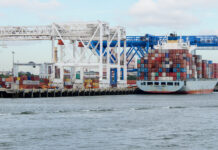
China had previously suspended tariffs on American cars.
Trade tensions between the U.S. and China escalated Friday, as Beijing introduced $75 billion in tariffs against American goods. The new tariffs include a 25 percent duty on American-made cars exported to China. According to Bloomberg, the new levies will start from December 15, 2019, as part of a two-stage rollout that affects other industries like soy as well as vehicles. Another 10 percent tariff will also go into effect on top of the 25 percent duty for some vehicles.
The move not only affects U.S.-based companies like Ford, but also European automakers like BMW and Mercedes-Benz. Those two have large production plants in South Carolina and Alabama, respectively, representing six of the ten best-selling imports to China from the U.S., according to estimates from LMC Automotive. Last December, China agreed to back off tariffs as it tried to work out its issues with the U.S. Now, those tariffs could inflate the prices of U.S. cars in China by up to 50 percent. The shifting prices will likely impact sales of U.S.-produced cars shipped to China.
For his part, President Donald Trump said he would respond this afternoon to China’s latest round of tariffs. He also fired off a set of tweets addressing the news this morning:
China promises further escalation
According to the Bloomberg report, China promised that any further U.S. tariffs will lead to continued retaliation. The U.S. government is currently planning a 10 percent tariff on $110 billion worth of Chinese goods starting September 1. From there, another 10 percent tariff will hit $160 billion in goods on December 15. The Trump administration planned a stagger approach to ease its overall impact on the economy.
American businesses are actively being encouraged to sever ties with China and favor U.S.-based goods instead. According to people familiar with the situation, Chinese negotiators are still planning a trip to Washington in September, offering some chance for a reprieve.
























